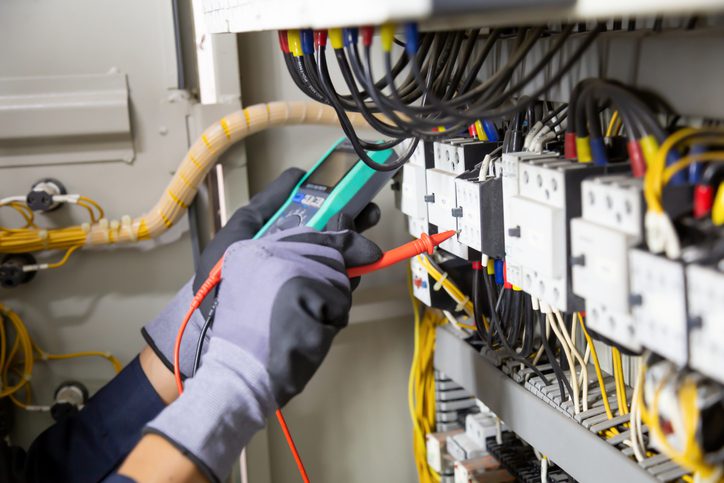Hearing the buzz around electrical engineering but not sure exactly what they do? You’ve come to the right place! Electrical engineers apply mathematics, physics, and engineering principles to design, develop, test, and manage the manufacture and maintenance of electrical equipment. Electrical engineers are similar to mechanical engineers except they work on electrical systems rather than mechanical equipment.
Electrical engineers maintain components in electrical systems so that they operate in a safe, efficient way. These engineers also challenge the status quo by actively looking for and creating new and better ways to influence the manufacturing process. In this way, they are highly inventive, forward-thinking, and imaginative engineers.
To become an electrical engineer, you will need to earn a bachelor’s degree in electrical engineering. Practical experience from internships and co-ops, advanced mathematics and physics knowledge, complex problem-solving, and critical thinking skills are indispensable to an electrical engineer—and highly desired by employers.
Because the pulp and paper industry is committed to product innovation, improving manufacturing processes and protecting the environment, job opportunities for electrical engineers in the industry are expected to rise. The demand is high for their complex problem-solving skills and superior knack for innovation. Here are three examples of careers that could be waiting for you as an electrical engineer!
Electrical Reliability Engineer
Average Annual Pay: $75,000 to upward of $115,000+
What You’d Do: Electrical Reliability Engineers manage the planning, organization, and completion of reliability programs in a mill environment. They develop reliability programs for all electrical machinery and work closely with Operations and Maintenance personnel to implement and monitor all electrical systems. They provide technical direction and offer solutions for electrical maintenance projects including predictive and preventative measures, sourcing electrical components and spare parts, and creating equipment manuals for inspections.
Electrical Reliability Engineers:
- Perform inspections and predictive maintenance for electrical reliability programs
- Manage equipment, manuals and procedures, and collaborate with other personnel
- Seek opportunities to improve performance, lower costs, and promote safety
You could be an Electrical Reliability Engineer if… you’re independent, adaptable, and decisive—and a great leader. Multi-tasking and performing jobs under pressure is no sweat for you (and you may even prefer it). Your communication skills and creative problem solving will improve the work of your colleagues and the company and its products.
Process Control Engineer
Average Annual Pay: $75,000 to upward of $107,000+
What You’d Do: Process Control Engineers are responsible for the maintenance, inspection, troubleshooting, and optimization of all electrical systems including their hardware and components. These engineers generally work in a manufacturing environment along with mechanical engineers and operations and maintenance personnel. They are also responsible for all written materials including reports, maintenance manuals, troubleshooting checklists, plans and more.
Process Control Engineers:
- Inspect, maintain, and troubleshoot electrical equipment and processes to determine long term solutions
- Analyze and interpret data, provide written documentation/guidance on desired outcomes
- Positively impact manufacturing process by modifying existing or designing new electrical components/systems
You could be a Process Control Engineer if… you like to be knees deep in the details and can effectively communicate them to various teams and departments. Your work aims to be always one step ahead—with potential issues and their solutions already considered—for the safety, efficiency, and optimization of your workplace.
Electrical & Instrumentation Engineer
Average Annual Pay: $75,000 to upward of $134,000+
What You’d Do: Electrical & Instrumentation Engineers (E&I) are experienced in the fundamentals of process control but are known for their advanced technical experience. Their expertise lies in their ability to perform research, conduct tests, and in designing, building, and implementing electrical equipment, components, and systems with the objective of improving processes. They’re responsible for communicating the purpose of their designs and solutions to a variety of personnel who may not be as technically knowledgeable.
E&I Engineers:
- Apply mathematics and engineering principals to test, maintain, and improve electrical equipment, components, and systems
- Design, document, and communicate all diagrams, plans, layouts, manuals, and schedules for all electrical equipment
- Collaborates, manages, and advises junior engineers and other personnel on projects to ensure technical accuracy
You could be an Electrical & Instrumentation Engineer if… your idea of fun growing up was building models, computers, or taking anything interesting apart only to put it back together in a better, cooler way. You’re technical, mechanical, and aren’t afraid to experiment—that’s where the fun and innovation can be found. Your work is critical in keeping electrical systems safe, reliable, and always improving.
Being an electrical engineer is one of the highest paid job opportunities available to engineers and provides a stimulating career path. Engineers must be collaborative and decisive, analytical and imaginative. Even more, they must enjoy predicting and solving complex problems that will make their workplace, the pulp and paper industry, and the environment a safer place.


Recent Comments